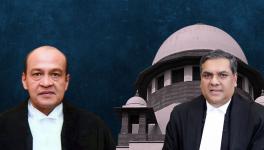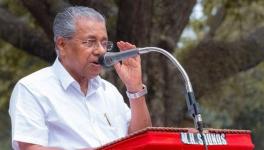Kerala, Tamil Nadu Take Governors Head-on
Image Courtesy: Wikimedia Commons
In an unprecedented move, the ruling parties of Kerala and Tamil Nadu (TN) took their governors head-on in an escalating war of words on Wednesday.
While Kerala’s Left Democratic Front (LDF) alliance decided to remove Arif Mohammad Khan as chancellor of universities, Lok Sabha and Rajya Sabha members of the Dravida Munnetra Kazhagam (DMK)-led Secular Progressive Alliance submitted a memorandum seeking the removal of RN Ravi over 21 pending Bills to the Rashtrapati Bhavan.
Kerala chief minister Pinarayi Vijayan’s Cabinet voted to introduce an ordinance to remove Khan after the governor asked the vice-chancellors (V-Cs) of all nine state universities to resign, NDTV reported. The V-Cs subsequently approached the High Court (HC) challenging Khan’s order.
“The Ordinance is meant to amend the university rules pertaining to the post of chancellor of the universities in the state. The draft of the ordinance would remove the particular section from the university rules, which has made the governor the ex-officio chancellor of the 14 universities in Kerala,” an official release from the CMO reads.
The decision was taken after considering the recommendation of the MM Punchhi Commission on Centre-State relations, which had stated that it would not be proper to appoint the governor as the chancellor considering his other constitutional obligations, the statement further reads, The Indian Express reported. The Commission had opined that a governor holding the post of chancellor should be avoided, it adds.
The LDF government also relied on the recommendations of the Kerala State University Law Reforms Commission, which pointed out this year that the state government can relook into the practice of designating the governor as ex-officio chancellor of universities. There is no compulsion on the state government or the Legislative Assembly to retain the present position, the Commission had pointed out.
The Vijayan government plans to replace the governor as chancellor with an expert academician, according to state higher education minister R Bindu.
According to the release, the Cabinet feels that appointing academicians as heads of universities would help transform Kerala’s higher education institutions as “hubs of centres of excellence”.
After the Cabinet meeting, Bindu told the media that the decision is part of the reforms in the higher education sector, according to The Indian Express.
“The governor has the constitutional obligation to sign the ordinance. We hope he will fulfil that obligation. Due to the recent developments in the universities, the state’s higher education sector is in crisis. We cannot allow things to go like this. The government has given top priority to enhancing the standards in the higher education sector,” Bindu said.
According to the rules, the chancellor can appoint the V-C out of a panel of names recommended by an official committee but the state government had recommended only one name. After the Supreme Court said that the chancellor “had no other option” as there was no list of names, Khan appointed Ciza Thomas as V-C-in-charge.
Subsequently, the state government requested the HC on Tuesday to hold Thomas’s appointment but the court refused to do so.
The tussle between the Kerala government and the governor over the functioning of universities, including the appointment of V-Cs, is intensifying.
Last week, Communist Party of India (Marxist) state secretary MV Govindan had said that the government would go to any extent to fight Khan. A few months ago, the Assembly passed the Kerala University Laws (Amendment) Bill, aimed at giving an upper hand to the state government in the selection of V-Cs.
On Tuesday, the chancellor’s legal adviser K Jaju Babu and standing counsel advocate MU Vijayalakshmi resigned citing reasons “known to you (governor)”. Babu was representing the governor in the case where V-Cs challenged Khan’s order seeking their resignations.
Earlier, CPI(M) general secretary Sitaram Yechury told Outlook that Khan was working to fulfil his personal political objectives. Vijayan had also accused the governor of saffornising the institutions.
In Tamil Nadu, the tussle between the ruling DMK-led Secular Progressive Alliance government and governor Ravi increased after members of the coalition in the Lok Sabha and the Rajya Sabha signed a memorandum seeking his removal last week over delaying assent to the Bills.
The DMK said on Wednesday that the memorandum was submitted to the Rashtrapati Bhavan, The Hindu reported.
“We must place on record our dissatisfaction that the work being done by the Tamil Nadu government and the legislature is being obturated by the office of the governor by openly contradicting its policy in public and unduly delaying assent to Bills,” the memorandum reads.
“The Tamil Nadu Legislative Assembly has enacted several important Bills and sent the same to the governor for assent. We are pained to note that the governor is unduly delaying assent to the Bills, passed by the State Legislature,” the memorandum reads further.
Listing out a total of 20 Bills, including The Tamil Nadu Universities Laws (Amendment) Bill 2022, which empowers the state government to appoint V-Cs of the state universities under the administrative control of higher education Department, the memorandum notes that this amounts to interference in the administration of the state and transaction of business by the Legislature”.
“It impedes and obstructs a democratically elected government from serving the people, which is ex-facie unconstitutional,” the memorandum adds. “It is trite that under the scheme of our Constitution, a governor cannot sit as an appellate authority over the decision of the Cabinet or the legislature. The need, requirement or necessity of a Bill cannot be inquired into by the governor. That is within the sole prerogative of the Legislature, which extensively debates the necessity of the Bill.”
Once a Bill is passed, it is “deemed to be the will of the people and the governor has to act within the frame work of constitution,” it further notes.
The memorandum also mentioned the delay in sending the Bill seeking NEET exemption for the President’s assent.
Mentioning the governor’s “unfortunate propensity to publicly profess his lack of faith in the secular ideals of this country” the memorandum says that “this is an embarrassment to our government, which has utmost commitment to the secular ethos of this nation”.
Citing Ravi’s remarks that “India is dependent on one religion like the rest of the world”, the MPs alleged: “This statement is an affront to India’s Constitution and remarks like praising Sanatana Dharma, communalising the jewel of Tamil literature—the Thirukural and denouncing Dravidian heritage and Tamil pride. These statements have caused deep wounds to Tamil sentiments and pride”.
Get the latest reports & analysis with people's perspective on Protests, movements & deep analytical videos, discussions of the current affairs in your Telegram app. Subscribe to NewsClick's Telegram channel & get Real-Time updates on stories, as they get published on our website.
























